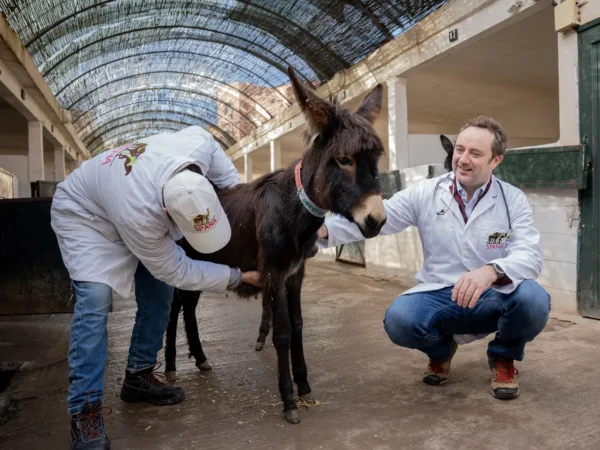One Health
Introduction
At SPANA, one of our charity’s goals is for the world of working animals to thrive and grow sustainably as part of the nexus of animals, people and the environment. This link is known as the One Health approach. But what is One Health? Why is the One Health approach important? And how does SPANA’s work connect to One Health? Read on to find out more about One Health and how the approach is crucial for the welfare of working animals.
What is One Health?
One Health is a concept that concerns the link between animals, people and the environment. It recognises that the health of animals, people and the environment are all interconnected and that if one suffers, all three suffer.
Although the concept of One Health has been around for more than a century, it is only in more recent years that One Heath has been developed and adopted by global organisations – largely in response to growing concerns over the prevalence of zoonotic diseases that can be transmitted from animals to humans.
Why is the One Health approach important?
But why is One Health important? Sadly, people have historically exploited animals and the environment, while failing to appreciate the critical interdependency between them. The consequences of this exploitation have been severe, leading to, for example, the climate crisis, an increase in antimicrobial resistance and the global spread of deadly zoonotic diseases.
The devastating impact of the global coronavirus (Covid-19) pandemic on people’s lives and the global economy forced many leading decision-making organisations to re-examine our relationship with nature. By working together on a One Health approach, organisations from different sectors, such as veterinary, public and environmental health, can detect, predict, prevent and combat One Heath-related problems.
Four of the world’s leading decision-making organisations – The World Health Organization, the Food and Agriculture Organization, the World Organisation for Animal Health and the United Nations Environment Programme – have developed a One Health Joint Plan of Action to focus on One Health and its crucial importance to the world we live in.
In 2022, the World Bank estimated that the benefits of One Health were worth at least £28.3bn a year to the global community.
The importance of the One Health approach is recognised on One Health Day – a global awareness campaign observed on 3 November each year.
One Health and animal welfare
The One Health approach is vitally important to improving the welfare of working animals. This importance was recognised at the highest level in 2022. The United Nations Environment Assembly (UNEA) is made up of 193 countries who meet every two years to address the world’s most critical environmental challenges. On 2 March 2022, the UNEA voted to adopt a resolution that recognised the link between animal welfare, the environment and sustainable development.
Its resolution – which is known as the ‘Animal Welfare – Environment – Sustainable Development Nexus’ – acknowledged that ‘animal welfare can contribute to addressing environmental challenges, promoting the One Health approach and achieving the Sustainable Development Goals’. It noted that ‘the health and welfare of animals, sustainable development and the environment are connected to human health and well-being’ and acknowledged ‘the increasing need to address these connections through the One Health approach, among other holistic approaches’.
The resolution was the first to be tabled and approved by the United Nations with explicit reference to animal welfare, and gives animal welfare the global recognition it deserves .
Linda Edwards, SPANA’s Chief Executive, said: ‘Just as SPANA has recognised for more than 100 years, there is now formal, global recognition for the need to change our relationship with animals from one of exploitation to one of promoting their welfare. This is an important achievement for working animals as SPANA works towards a world where every working animal lives a healthy and valued life.’
One Health and SPANA
At SPANA, we recognise the importance of the One Health approach and the welfare of working animals.
In the countries where we work, we’ve developed a strategy focused on the One Health approach to significantly improve the welfare of working animals across the globe on a sustainable, long-term basis. Our strategy is in line with the United Nations’ Animal Welfare – Environment – Sustainable Development Nexus.
In everything we do, we have an overriding approach of ‘Do No Harm’ – be that to the environment, people or the working animals we are here to support. Our aim is to pioneer new ways to inspire, educate, empower and collaborate, to ensure we respect that interdependency, with the ultimate focus of transforming working animal welfare.
We also work with key organisations, including the World Federation for Animals and the International Coalition for Working Equids, to call for policy actions that focus on improving animal welfare and that follow the One Health approach.
How you can help
SPANA’s mission is to transform the welfare of working animals in a world where animals, people and the environment are respected and thrive.
Our vital work is only possible due to the kindness of our supporters. Thanks to your compassion, we are able to provide expert veterinary care to sick and injured working animals, to empower their owners by providing training in good animal welfare and to teach children about the importance of working animals, all so that we can achieve a long-term, sustainable transformation in the welfare of working animals. Find out more here.


